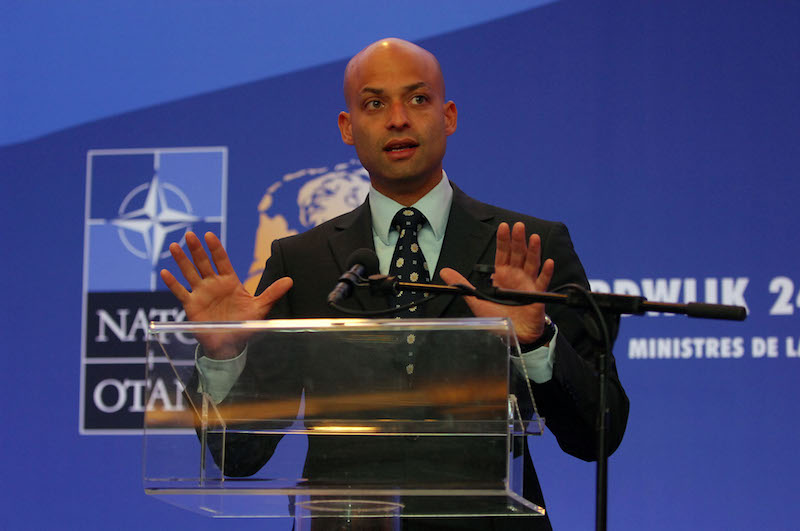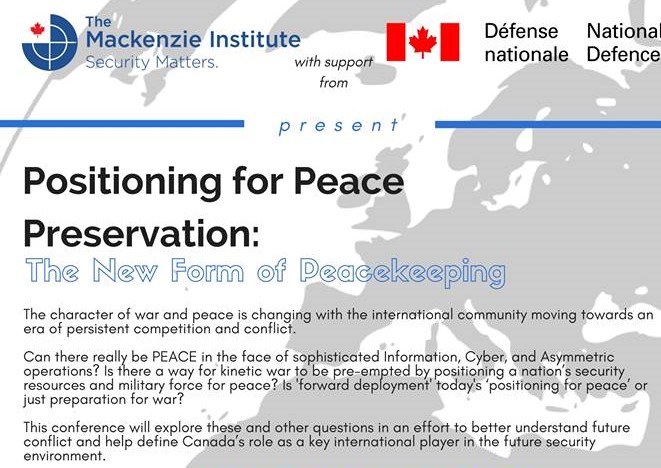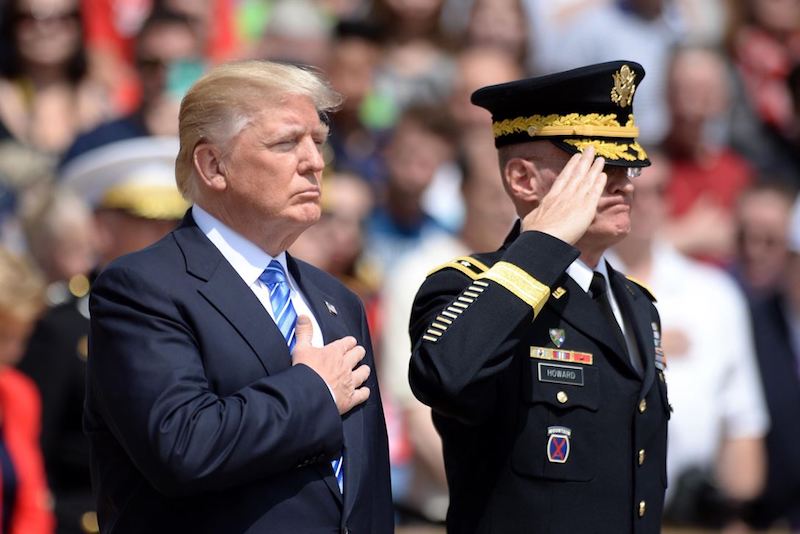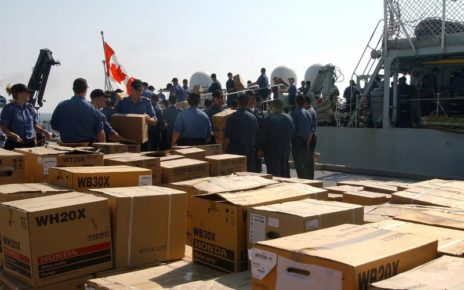On behalf of NATO Association of Canada I had the privilege to interview James Appathurai, who is the Deputy Assistant Secretary General for Political Affairs and Security Policy and NATO Secretary General’s Special Representative for the Caucasus and Central Asia. Mr. Appathurai discusses his background and early career, as well as, his duties and responsibilities at the NATO headquarters.
Andi: As many of our readers are students, could you please tell us a little about yourself, what you studied in University, and what interested you to choose this career path?
James: First I must say, I was always interested in Security issues. My mother tells me, although I do not remember, when I was 12 I told her I wanted to work at NATO. Apparently I was consistent. When I studied in school, just to note my father was a former diplomat and a professor of political science, and my mother was a high level of public servant, so I maybe had it a bit in my background. I studied Political Science and History for my Undergrad at University of Toronto, and then I studied International Relations and International Law in Graduate School at the University of Amsterdam.
James: What I would say for those who might be interested in a similar career, or actually any kind of career in diplomacy, is that by far the most useful thing I studied was the history, rather than the political science or the international relations. I find that a lot of the political science was highly theoretical, largely irrelevant to what we actually do on a day-to-day basis. Most places that have some kind of conflict, maybe other places as well, but we look at conflict zones; the history weighs heavily on them. Often there are historical reasons why this is happening; certainly any solution needs to take account the way the country is. The way the country is, is always because the way the country was. It’s very important. The second thing I would note, for Canadians, history is very short by definition. We actually don’t study it that much, we don’t care that much about it, and I think this is very very healthy in a certain way, and that is Canadians look forward. Something happened in the past we deal with it we move on, and we don’t dwell on it, we move forward. A lot of places don’t do that, they nurse historical grievance, and they don’t want to move forward, until they have nursed that grievance, until they have won what is a historical battle. They still look back to battles 700 years ago that they lost, which are very current in the minds of the people, I think is very unhelpful. Frankly, the Balkans is full of these festering memories, which don’t help them to move forward. History is key if you want to be a diplomat, and I would encourage anyone to study that.
Andi: What skills are important in your career field?
James: One is, I don’t know if this is a skill or a characteristic, but calm, a calm personality is very important. My particular field is one where it’s basically a non-stop series of crises, and being able to keep your calm is actually very very important. So I generally tend to look for in colleagues, or people that I hire, people who have a particular demeanor who are calm. Second, and this is a very important skill set, and that is the ability to write. By write I don’t mean long flowing books, but precision being able to differentiate what is important and what’s not important, to construct an argument that leads to a conclusion, is something which not everyone can do. My experience is that, and I’m not saying this just to flatter Canadians, but it’s a well known feeling here in NATO, which is you know 28-29 members, Canadians have very well trained writers. That is important.
I would say two more things. One is being able to understand the key point, I always tell my colleagues If you can’t say it in one sentence you don’t understand it. I believe that very much. The final point is, and this is something really important for someone who is in diplomacy, or in particular in multilevel organization, but its probably just as true for any big organization, and that is people who want something to happen, rather than seeking an agreement. The lowest common denominator is where you can always find what you should do in a position like mine, or other positions in government, I think everywhere is to seek a solution that makes a difference to push forward. And that is hard, sometimes you fail, and sometimes I fail, but at least I tried, and I think that is a very valuable characteristic in a public servant.
Andi: What advice would you give to someone who wants to pursue a career path similar to yours?
James: I would say a couple of things. First, I am not sure I did necessarily the right thing. In that I specialized in a particular area. I have risen to a good level, and relatively young age for the position I am in, but I have a narrow specialization. The opportunity for further advancement are probably fewer than they would be for very good friends and colleagues of mine who chose a different approach, which was to do lots of different things when they were young. Different departments, different issues, different countries and as a result now, when the very top positions come open, they have qualities and experiences that I have not had. Therefore, they have greater opportunities for advancement in their careers.
That’s one thing I would advise people to look at. The second thing I would say is to take jobs where someone who decides on your next step might actually see you. I find it in my experience as a Canadian, and with Canadians, we have in our culture very dutiful perspective on hard work leading to reward. If you work hard, put your head down produce good results, you’ll get promoted because people will see you. In fact that’s 50% of the truth, but it’s not all of it, because someone has to see what you do. I think that’s important for everyone to be a little bit self-promoting, to make sure what they do is recognized by the managers, so when time comes for promotion, people see what they’ve done. A little bit of self-promotion, not too much because that also counter-productive, but just enough so people see what you did is important. Final point I would make is my experience has been experience in public affairs, not just in diplomacy but in public affairs, media relations, public diplomacy, has proven invaluable. First, It teaches you a certain skill set, how to communicate effectively, and secondly so much of public policy in government now is intimately related with that. So that’s an experience, which has proven very valuable to me, also in career advancement. I would recommend that to other.
Andi: How has choosing a career path changed from when you started to now?
James: You’re right it’s different now, and harder for you guys. Now as an employer I would say two things. One education is key, because so many people are well educated. Ill be blunt about it, in my experience with the work that we do, and I mean pretty much across NATO, pretty much across the Canadian government when I was there, a master’s degree is a good level. A PhD, in my experience, was a lot of time added to someone’s career, which didn’t help them. Unless you want to go into academia or particular roles in government that reward that particular skill set, I find it to be entirely unhelpful to people who are applying for positions throughout my career. The Masters was great, the PhD at best unnecessary, at worst a waste of time. That’s one thing to be open with you.
The second thing I would say is, internships pay off. They pay off because people see you. I’m not sure you learn anything in particular more, but the people who are hiring, work with you for a while, and they say I like him or I like her, and I have brought on to NATO a lot of people that started as interns, and who proved their value. Unfortunately for them, they were off on their 8th internship, and that’s tough. One of the things that concern me is that we don’t just end up giving jobs to rich people, or rich people’s kids because they were the ones who were able to afford 8 unpaid internships in a foreign city, in a row. That’s a real risk in today’s employment market. I fight hard against that. The reality of that is people of less privileged backgrounds are less able to do this marathon of internships, required now, to land a job. That’s something we need to work at. To answer your question directly, internships and master’s degree, I think, are proving in my world to be useful.
Work Related Questions:
Andi: Working at headquarters, what are your day-to-day duties as the Deputy Assistant Secretary General for Political Affairs and Security Policy and NATO Secretary General’s Special Representative for the Caucasus and Central Asia?
James: The short version is my division is responsible, in essence, for what we call projecting stability. It’s the external relations of NATO. Our relations with 40 partner countries, with United Nations, with European Union, African Union, GCC etc. That of course means political analysis, political relations with them, practical cooperation; we do all their practical partnerships with them. That means focusing on particular areas, like defence capacity building for countries a bit at risk. It means managing relations with Russia, which is extremely complicated these days.
Nowadays it also means trying to help countries in the Middle East and North Africa strengthen the resilience against the instability that we all know about.
We’re trying to build relations with the EU, and I think for first time, things are getting a little bit of wind in their sails, which is great. With the UN things steadily go on, and then from an internal point of view we advise the secretary general on political issues. So there are different divisions that do operations, or do procurement, you know defense investment, got to make sure we have the capabilities or focus on emerging security challenges like missile threats or cyber. We do all the political stuff, which is a great job and it’s a big wide field to play on, which I really enjoy. To touch on what you mentioned before, I also have a particular role to represent NATO to the countries of the Caucasus, and to the countries of Central Asia. We have liaison offices there that help to sort of focus our engagement there. So I try to be NATO’s special representative to them, but also be their special representative back to NATO, because these are regions which are under a lot of Russian pressure on one hand, and which frankly our leadership does not know a lot about. Frankly, I did not know a lot about them until I took this job. So I try to make sure that they are understood here, and their equities are at least considered, and we can do something to help them.
Andi: What do you like most about the work that you do there? What challenges does your position pose?
James: I mean it’s a challenging position, it’s not a job where you get a lot of time to think, which is unfortunate. It involves a lot of chairing of committees, but that’s the way NATO works. We have an alliance that’s intergovernmental, there is no European commission that has its own powers. We have to help the allies come to decisions together. So chairing committees is about putting decisions on the table, bringing 28 countries together and saying OK where is the compromise? And coming back to what I said in the beginning, coming to a compromise, which moves the yardsticks forward. That’s very important. Not just to help them agree, but to help them agree on something that makes a difference. So we do a lot of that work, that can be quite frustrating, but it’s also very rewarding when you get a good decision. I went to Iraq a few months ago, more than once, negotiated with the Iraqi government to deploy NATO trainers into Iraq, to help them get stronger in defeating DAESH/ISIL. Came back here put the proposal on the table to the allies, exactly what roles we would play, exactly where, how many soldiers, what it would cost, what the legal arrangements would be, etc. Despite all the controversies about this, they came to the decision to do it. They adjusted the package put forth, but basically went for it. That was a very rewarding thing, and we decided now to start training in Iraq. So there are a lot of frustrations, but it is very rewarding when we get something accomplished.
Andi: NATOs mission in Libya helped to end a toxic regime, but the follow-through in providing security and development was not existent. What has NATO considered doing differently now?
James: You hit the key point dead on. I had a lot to do in Libya. There has to be follow-up. I think everybody recognizes that the campaign itself, which ended the Ghadafi regime, was the right thing to do. But the follow-up by everybody, including NATO, was basically non-existent. There are reasons for that, including there was no UN mandate, and that the Libyans wanted us to keep it at an arms length. But we did not push them harder. I went to Libya a few times afterwards, and designed plans what we could do, and those never went anywhere, which I really find to be one of the great disappointments of my career. But we now need to learn the lessons from that, and you hit on the key point.
So we need to have state power, we need to train local forces, we need to help them build institutions that can endure. So when the Secretary General talks now about NATO being a training alliance, alongside its other roles, we’re looking at what that means and how to keep it up. That’s one point. The second point is that we are very much focused on the institutions as well as the training, so in Iraq this time, we’re not just training in specific areas, but we’re going to put people in to advise the ministries that oversee the Iraqi forces in those areas to advise them on how to set up their institutions so they can sustain it when we go. This way it doesn’t disappear like it did last time. So we’re trying to learn the right lessons, and Libya is a key one that we didn’t, as an international community, including NATO, get right.
Andi: Projecting security is a big issue now, can you expand on NATOs future plans?
James: Well, yeah, that’s a long one. The short version is, at the recent summit in Warsaw we did a lot to sort of strengthen our walls. To strengthen the borders, and the security of NATO countries themselves, including battalions into our eastern allied countries, and setting up missile defense and all that stuff. But, we are not just pulling up the drawbridge; the reason is, aside from altruism, we also recognize self-interest. By which I mean that stability for our neighbours means better security for us, it’s that simple. We are tied to each other, we want to do more to project stability. What does that mean? It means in the East helping Ukraine, helping Georgia, helping Moldova, as specific countries, and doing more to help Sweden and Finland because that also helps us defend the Baltic States in NATO. It means a bigger focus on the Black Sea, because after annexing Crimea, Russia has moved high-end military equipment into Crimea, which is aimed to deny us access to that region. Most broadly for all of Europe to help the countries between NATO and Russia retain their political independence and their territorial integrity. Turning south projecting stability means basically addressing the problem of terrorism. You can address in many ways, that means helping Iraq defeat Daesh inside Iraq, and take away that territory, and that’s what we’re doing. Second, it means preventing the spread beyond Syria and Iraq. So that means helping Jordan and Tunisia, and we’ve stepped up support for them. Morocco and Algeria we’re in discussions on what we could do. And then, finally it means also doing it in better coordination with the European Union. They are everywhere, and we are everywhere, and we can do a lot better to make sure we don’t duplicate each other, and reinforcing what we do. So those are the broad themes in projecting stability.
Andi: Is there anything else you want our readers to know about what you do?
James: I would say one thing, and that is, that the Canadian decision to deploy a battalion to the Baltic States has really been well received in NATO, but also a received reaffirmation of NATO’s commitment to European security and to its allies. When others are questioning NATO, I am referring to the US election campaign; this was a very powerful signal and it really reinforced bonds between allies. Not just between Canada and its allies, but between all of them. So it was a very timely and welcomed gesture. I do not work for the Canadian government directly so I have no self-interest in saying this, I’ve been here a long time and that was a powerful signal for the whole alliance.
I would like to thank James Appathurai for taking the time to interview with the NATO Association of Canada, and for the insightful wisdom and advice he has offered our readers.
Photo: James Appathurai (2007), via NATO.
Disclaimer: Any views or opinions expressed in articles are solely those of the authors and do not necessarily represent the views of the NATO Association of Canada.




